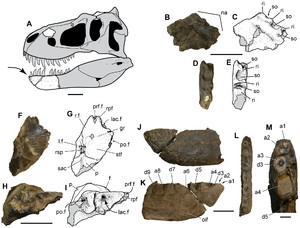Nanuqsaurus
| Nanuqsaurus | ||||||||||||
|---|---|---|---|---|---|---|---|---|---|---|---|---|

Fossil remains of the holotype and their location in a reconstructed skull |
||||||||||||
| Temporal occurrence | ||||||||||||
| Upper Cretaceous (Upper Maastrichtian ) | ||||||||||||
| approx. 69.9 to 69 million years | ||||||||||||
| Locations | ||||||||||||
| Systematics | ||||||||||||
|
||||||||||||
| Scientific name | ||||||||||||
| Nanuqsaurus | ||||||||||||
| Fiorillo and Tykoski , 2014 | ||||||||||||
| Art | ||||||||||||
|
||||||||||||
Nanuqsaurus hoglundi is a carnivorous dinosaur fromthe Tyrannosauridae family . Its remains were found in 2006 in the North Slope Borough in northern Alaska in deposits from the Late Cretaceous Period (Upper Maastrichtian ). He is related to the genera Tyrannosaurus and Tarbosaurus , but is characterized by a significantly smaller body size. The genus was named after the Inupiaq word "nanuq" for polar bear because of its location, the species epithet honors Forrest Hoglund for his contributions to the geosciences and his philanthropic work.
features

So far, only the holotype of the species has been described, of which three fragments of the skull are known, which are part of the anterior maxilla , part of the roof of the skull with parts of the frontal and parietal bones and the right side of the sphenoid bone and the tip of the left mandible with nine Include tooth sockets . Based on these remains, the total length of the skull is estimated to be 60 to 70 centimeters, which makes Nanuqsaurus one of the smallest known tyrannosaurs, since the holotype was an adult animal.
Besides the size, Nanuqsaurus differs from other tyrannosaurs in that the first two lower jaw teeth are reduced in size, and by a forward Y-shaped split end of the spur that runs from the sphenoid between the parietal bones. The small body size contradicts the Bergmann's rule , according to which the same cold-blooded animals in colder regions are usually larger than related species found in warmer latitudes, the other dinosaur genera such as Troodon appears to be true. The authors of the first description therefore suspected that the small size of Nanuqsaurus , similar to that of an island dwarf , could be a consequence of poor food availability.
literature
- Anthony R. Fiorillo, Ronald S. Tykoski: A Diminutive New Tyrannosaur from the Top of the World. In: PLoS ONE . Vol. 9, No. 3, 2014, e91287, doi : 10.1371 / journal.pone.0091287 .
